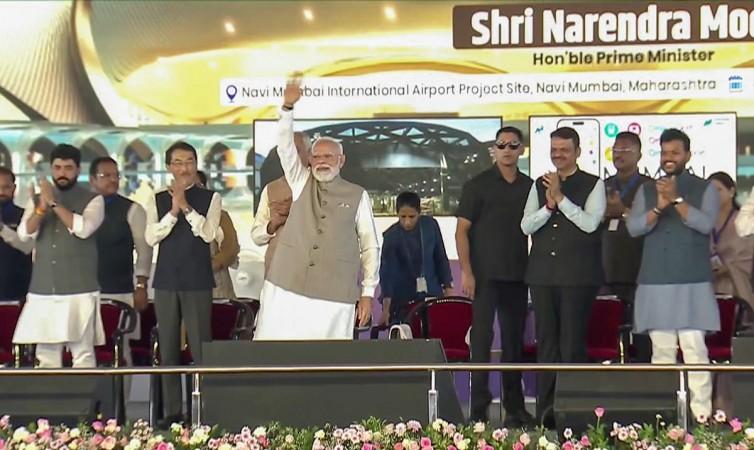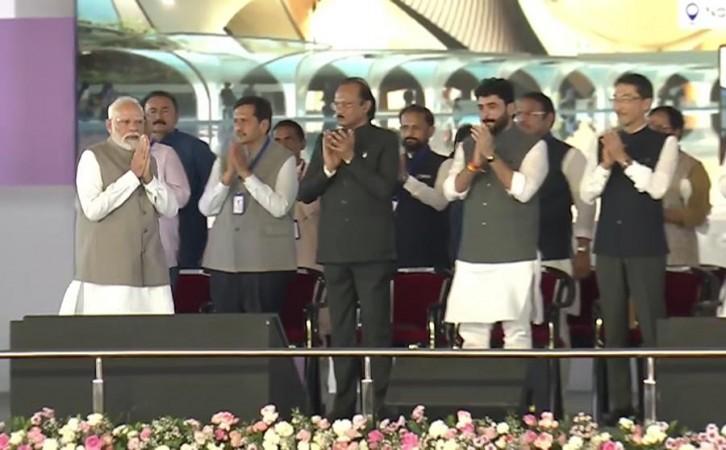
Prime Minister Narendra Modi on Wednesday inaugurated the final phase (2B between Atre Chowk and Cuff Parade) of the Mumbai Metro Line 3, constructed at an estimated cost of about Rs 12,200 crore.
With this, PM will dedicate to the nation the entire Mumbai Metro Line 3, also known as Aqua Line, built at a total cost of over Rs 37,270 crore. This is expected to ease the vehicular traffic on Mumbai roads and facilitate a smooth ride for the city commuters.
The final phase will also provide a seamless connectivity to South Mumbai, comprising Fort, Kala Ghoda and Marine Drive, along with direct access to leading administrative and financial centres, including Bombay High Court, Mantralaya, Reserve Bank of India, Bombay Stock Exchange and Nariman Point.
PM Modi in his post on X said, "Phase 2B of the Mumbai Metro Line-3 is a significant enhancement to Mumbai's infrastructure! Metro connectivity is essential for a city's growth. This project will have a positive impact on the lives of the people of Mumbai."
According to the Mumbai Metro Rail Corporation (MMRC), the travel from Cuffe Parade to Aarey JVLR will be less than an hour. Travel fare starts at Rs 10 and goes up to Rs 70, which will be affordable to everyone. Train availability will be every five minutes from 5.55 am to 10.30 pm.
MMRC said the commuters will experience eco-friendly travel, which will save 2.61 lakh tonnes of CO2 emissions every year. The 33.5 km Mumbai Metro Line 3, which is the first underground metro, from Cuffe Parade to Aarey (Jogeshwari Vikhroli Link Road) with 27 stations, is expected to cater to 13 lakh passengers per day.
#Watch | PM @narendramodi launches ‘Mumbai One’, India’s first integrated mobility app for planning, booking, and paying across 11 public transport services, including Metro, monorail, suburban rail, and buses.
— DD News (@DDNewslive) October 8, 2025
Watch Live: https://t.co/Rs51xK2t90@PMOIndia @MIB_India @PIB_India… pic.twitter.com/lhjmoxaUTj
Further, PM launched "Mumbai One" – an Integrated Common Mobility App for 11 Public transport Operators (PTO) across Metro, Monorail, Suburban railways and Bus PTOs. These include Mumbai Metro Line 2A & 7, Mumbai Metro Line 3, Mumbai Metro Line 1, Mumbai Monorail, Navi Mumbai Metro, Mumbai Suburban Railway, Brihanmumbai Electric Supply and Transport (BEST), Thane Municipal Transport, Mira Bhayander Municipal Transport, Kalyan Dombivali Municipal Transport and Navi Mumbai Municipal Transport.
Mumbai One App offers commuters a range of benefits, including integrated mobile ticketing across multiple Public Transport Operators, elimination of queueing by promoting digital transactions, and seamless multimodal connectivity through a single dynamic ticket for trips involving multiple transport modes.
It also provides real-time journey updates on delays, alternative routes, and estimated arrival times, along with map-based information on nearby stations, attractions, and points of interest, as well as an SOS feature to ensure commuter safety. Together, these features enhance convenience, efficiency, and security, transforming the public transportation experience across Mumbai.

First-of-its-kind Multimodal Journey Planner will provide the fastest and most cost-effective travel routes across the city. There will be Cashless and Contactless Transactions via digital wallets and prepaid balance - in line with Digital India objectives.
The app will guide domestic and international tourists to major city attractions, along with curated dining and cultural hubs. It will be a transformative step towards the "Mumbai in Minutes" vision and model for replication across Indian metro cities.
Prime Minister Narendra Modi inaugurated the Chief Minister's Short Term Employability Programme (STEP) on Wednesday, which aims to provide industry-relevant and employment-oriented training to the youth in Maharashtra.
The state Department of Skill, Employment, Entrepreneurship and Innovation, which will implement the programme, expects that 75,000 trainees will be provided employable skill training in the current year, and about 1 lakh trainees from next year.
According to the Minister of Skill, Employment, Entrepreneurship and Innovation, Mangal Prabhat Lodha, the inaugural programme is being organised at 600 locations across the state with artisans from the Vishwakarma community, local artists and experts in traditional trades invited as chief guests. This will honour their contributions and foster respect for traditional skills in the community.
"Under this program, a total of 2,506 units will be started in 419 government industrial training institutes (ITIs) and 141 government technical schools in the state. Through this initiative, skill education is being decentralised, and the courses have been selected according to local demand and public interest. The institution management committees of each district will run these courses at the local level. This will increase local participation and accountability in all aspects of education planning, implementation and quality control," said Minister Lodha.
He further stated that the main objective of this initiative is to provide modern skill training to the youth of the state as per the changing demands of the industries and to make them self-reliant. It also aims to provide self-employment opportunities to the youth and women candidates from rural areas through training at the local level.
According to the government release, the admission process for this program is being implemented completely online, and interested candidates should register on the website https://admission.dvet.gov.in.
The training fee has been fixed at Rs 1,000 to Rs 5,000 per month. About 25 per cent of the seats have been reserved for trainees in the institute, and the remaining seats will be open to external candidates.
Students of ITI, as well as students pursuing 10th, 12th, diploma or degree will be eligible for these courses. The programme includes courses related to modern technology, including topics such as additive manufacturing, drone technology, electric vehicles, solar energy, cybersecurity, Internet of Things, artificial intelligence, green hydrogen, mobile repair technician and social media influencer, among others.
"About 364 special batches will be started for women candidates, and 408 special batches for emerging sectors. Special training centres will be started in Gadchiroli, Latur, Nagpur and Amravati as per the local industry needs, and a special course 'Vedic Sanskar Junior Assistant' will also be implemented, keeping in mind the Kumbh Mela to be held in Nashik," said Minister Lodha.
(With inputs from IANS)











